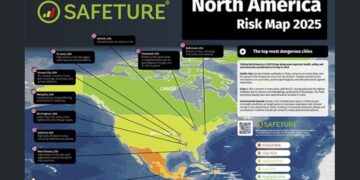To address the rising threat of wildfires, Safeture, a leading technology provider for people risk management, and its partner Riskline, a well-known travel risk intelligence company, have published a new report titled “Wildfire Informer 2025.” This detailed guide highlights global wildfire activity and includes practical tips for travellers on how to prepare and reduce exposure to wildfire-affected areas. It also offers actionable advice for those caught in or near an active fire.
Wildfires are no longer isolated events. Once seen as regional disasters, they have now become a global issue, significantly affecting travel and creating serious health and safety concerns for millions worldwide. From the Mediterranean to the Americas, fires are increasingly impacting popular travel spots—often without warning.
“As wildfire seasons expand across every continent, so too must our awareness,” says Marcel Brandt, Chief Sales Officer at Safeture. “Travel today requires more than a packed suitcase and passport. It demands preparation, flexibility, and a clear understanding of potential risks. Knowing where and when wildfires are likely to occur—and how to respond if they do—has become essential for anyone navigating today’s climate reality.”
According to the report, the United States recorded the highest number of wildfires in 2024, followed by Chile and Australia. Greece, which ranked fifth after Canada, is already preparing for what authorities call a “worrying” 2025 season by deploying over 18,000 firefighters and 3,700 vehicles. Even Northern Europe has seen a rising fire risk: the UK experienced record-breaking wildfires in early 2025, which burned over 30,000 hectares of land.
Wildfires are part of a larger environmental trend affecting travel worldwide. Their effects can be immediate and extensive: flight cancellations, road closures, cities shrouded in smoke, and mass evacuations of vacation spots. Even fires burning hundreds of miles away can worsen air quality and trigger health warnings.
Travellers, especially those visiting rural or forested areas, should remain vigilant, monitor local news and official alerts (such as those from the European Forest Fire Information System, EFFIS), and be prepared with emergency plans. It’s also smart to consider travel insurance that covers natural disasters to reduce disruptions caused by wildfire emergencies.
Read the full Wildfire Informer 2025 https://safeture.com/wild-fires-informer-2025/
For more Safeture news, click here






